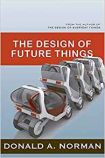The Design of Future Things by Donald Norman
| The Design of Future Things by Donald Norman | |
|
| |
| Category: Popular Science | |
| Reviewer: Magda Healey | |
| Summary: Dealing with everyday automation, robotics and smart machines, this is a clear call for a sound science of design. The cognitive psychology background that informs the suggested approaches would be valuable for those from hard engineering side of things, while an engaging style and admirable clarity make it readable by any educated readers with some interest in design, how things do work and how they should. | |
| Buy? Maybe | Borrow? Yes |
| Pages: 231 | Date: December 2007 |
| Publisher: Basic Books | |
| ISBN: 978-0465002276 | |
|
| |
Do you remember those cars led into the river by their navigation systems? Have you ever thought that Amazon's suggestions for you are ridiculous rather than useful? Ever wondered if the software you are trying to use is doing something or just hanging there? Been trying to interpret beeping and blinking signals on a coffee maker? Lulled into sense of false security by car's cruise control?
Or have you wondered how it would actually be to live in a house that responded to your every movement and action?
Many of us have, and even more will as automation progresses from the realm of the high-cost, high-end, multi-million pound applications in space exploration, rescue operation and industrial production to the hundreds-of-pounds scale of mass market everyday things. More and more items of everyday life claim to be "smart", "intelligent" or "adaptive", but sometimes it seems that instead of making our life more pleasant, easier or richer they cause endless frustrations, annoyance, pain and cost, both in terms of time and money.
Development of automated systems for daily use at home and at play is now somewhere in between manual controls and complete automation, and it's a dangerous point as far as safety of use goes and a very interesting one as far as development of design principles and practices goes.
Donald Norman is a psychologist and a co-author of one of the best handbooks for studying cognitive processes I have used (Human information processing, with P. Lindsay) as well as a renowned usability/ergonomics specialist and the author of now classic and very justifiably acclaimed The Design of Everyday Things, originally published as The Psychology of Everyday Things
In this new volume he turns from general usability issues so fascinatingly explored in the original book (foibles of cookers, doors, switches and taps) to the problems human beings are starting to have with automation, with so-called intelligent machines. There is a lot of research into the ergonomics of automation, but most of it relates to uses in professional or military situations, where the people using the systems are well trained and motivated. Norman calls for development of sound, scientific principles of designing automated goods for use at home and at play, in more demanding situations with less structure and users who don't undergo any training.
A lot of the basic principles that The Design of Future Things contains are the same or analogous to those as in the The Design of Everyday Things: there should be a conceptual model accessible to a user (so people can imagine what and why is happening; and, crucially, is the thing working well or broken down), there should be natural mappings between what the users can perceive and what the machine is doing (so moving a lever forward would mean that the object moves forward too, or a vibration in the car seat means that a road is getting bumpy), it should be obvious how objects are to be used (e.g. a plate invites pushing, a smallish vertical handle - pulling), the output should be understandable (so we can interpret errors).
But there are also quite a lot of problems that are specific and particularly important for design of high-tech automated objects, and the most important is communication. Or, as Norman argues, as the devices we have are not really capable of communicating (and won't be for a very long time), signalling and feedback.
Thus, the need for continuous feedback - even when things are going right (so we are not caught unaware when something goes wrong). Thus, the even more pronounced need for natural signals and understandable errors - and if the mechanism itself is quite and hidden away, even more so. This is particularly important when the comfort provided by automation may make the user complacent: and thus, sometimes even a need for seemingly perverse designs which make things appear more difficult and dangerous, while actually making them safer.
A lot of those principles are based on how human information processing works and how humans behave in natural situations. Norman compares tasks at which humans are good and machines are good and analyses the insurmountable gulf between human and machine capabilities, resulting in lack of common ground between the two. This gulf should be informing all the design of smart machines and automated systems for the future.
Norman also contrasts different approaches to automation and smart technologies - one that is intrusive, forceful and can very easily become counter-productive (for example a house which puts on the light when one gets up in the middle of the night because of insomnia and thus wakes the whole family up) and another, which he calls augmentative (where machines support, suggest and make easier doing things our way rather than decide, boss us about and try to make us do things their way).
I personally was rather disappointed with how much space Norman devoted to and how many of his examples were from the field of car technology. This is a personal bias of mine. I dislike cars, don't have a driving licence and even when driving use a vehicle in which electric windows (in the front only) are about as far as automation goes. Thus I can neither get excited or relate to all those automation issues discussed and tested on car examples and I was depressed by the vision of the humanity's future full of intelligent cars swarming and platooning instead of (what I sincerely hope for) disappearing into the annals of human folly.
It's obviously partly because the car industry is at the forefront of consumer goods automation, and also possibly because driving is a very complex task so pitfalls of half-way automation are more visible there than in devices like smart washing machines or microwaves (which probably work quite well).
But the vast area of modern consumer electronics: televisions, music players, computers and mobile phones, never mind the Internet got only a few mentions (with a fascinating insight into the failure of Apple Newton a particularly honourable one), but was essentially totally overridden by all those cars.
This was disappointing as going by the title, I expected to read much more about the area usually called HCI (human computer interaction). I can only hope that Donald Norman has been saving his thoughts on interface and software in order to devote a whole new book to them!
Still, The Design of Future Things is an interesting and important book, full of examples, erudite, obviously very well versed in cutting edge usability research but also well written and clearly presented. The cognitive psychology background that informs the principles of design that Norman suggests would be particularly valuable for those who come from the hard engineering side of things, while an engaging style and admirable clarity make it readable not only by the specialists or students in the field of psychology, usability or ergonomics but by any educated readers with some interest in design, how things do work and how they should work. Those who don't know the The Design of Everyday Things should read that first, though.
Thanks to the publishers for sending the Bookbag this important volume.
You might also enjoy The Shock of the Old by David Edgerton.
Please share on: ![]() Facebook,
Facebook, ![]() Twitter and
Twitter and
![]() Instagram
Instagram
![]() You can read more book reviews or buy The Design of Future Things by Donald Norman at Amazon.co.uk Amazon currently charges £2.99 for standard delivery for orders under £20, over which delivery is free.
You can read more book reviews or buy The Design of Future Things by Donald Norman at Amazon.co.uk Amazon currently charges £2.99 for standard delivery for orders under £20, over which delivery is free.
![]() You can read more book reviews or buy The Design of Future Things by Donald Norman at Amazon.com.
You can read more book reviews or buy The Design of Future Things by Donald Norman at Amazon.com.
Comments
Like to comment on this review?
Just send us an email and we'll put the best up on the site.


